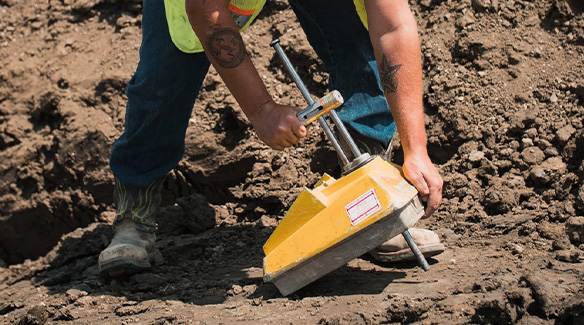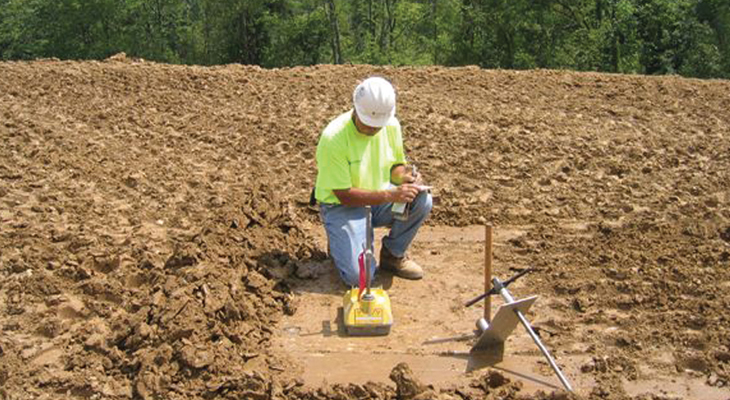Leading Geotechnical Engineers for Cutting-Edge Soil Evaluation and Structure Design
Leading Geotechnical Engineers for Cutting-Edge Soil Evaluation and Structure Design
Blog Article
Understanding the Crucial Function of the Geotechnical Industry in Modern Building And Construction Projects and Framework Advancement
The geotechnical industry is a cornerstone of modern-day construction and framework development, supplying crucial insights right into dirt behavior that directly affect task end results. Through advanced soil analyses and innovative design solutions, geotechnical professionals not just ensure structural stability however likewise address sustainability problems in the middle of evolving environmental criteria.
Importance of Soil Assessment
Soil evaluation plays a vital role in the geotechnical sector, working as the foundation for notified decision-making in construction jobs. Accurate soil analysis is essential for determining the viability of a site for different types of structures, consisting of household homes, business structures, and bridges. By evaluating soil composition, dampness, thickness, and toughness material, engineers can prepare for prospective difficulties and reduce dangers associated with ground instability, erosion, and settlement.
The assessment procedure commonly involves a series of examinations and monitorings that offer important details about the subsurface problems. This data educates the style and building processes, making certain that frameworks are constructed on solid ground with ample support. Understanding the soil account allows engineers to choose appropriate construction approaches and products, optimizing source application and decreasing expenses.
Along with guaranteeing architectural honesty, dirt assessment contributes to ecological sustainability. By identifying prospective contamination or unfavorable results on surrounding environments, engineers can implement approaches to protect these natural deposits. In general, extensive soil evaluation is essential in the geotechnical field, underpinning the safety and security, performance, and ecological obligation of construction projects.
Trick Geotechnical Methods
A range of vital geotechnical strategies are employed to enhance the stability and evaluate and performance of building and construction sites. One foundational technique is soil sampling and testing, which allows engineers to establish the physical and chemical properties of the ground. This information is crucial for making informed choices relating to structure layout and construction methods.
One more crucial technique is site characterization, which entails the thorough analysis of dirt and rock problems with techniques such as borehole exploration and in-situ testing. Techniques like Requirement Penetration Tests (SPT) and Cone Infiltration Examinations (CPT) provide useful data on dirt stamina and stratigraphy.
Ground renovation methods, such as dirt stabilization and grouting, are likewise important in enhancing the load-bearing capability of weak soils. These methods can mitigate settlement and enhance overall site problems.
Additionally, incline security evaluation is vital for determining prospective landslide dangers and making sure the safety of excavations. This evaluation usually utilizes mathematical modeling and limitation stability methods to predict soil actions under various conditions.
Integrating these geotechnical techniques into construction planning not just optimizes project end results yet additionally ensures the long-term sustainability of infrastructure advancement.
Effect On Building Safety

Additionally, reliable geotechnical design involves executing reduction strategies for recognized risks. This might consist of soil stablizing strategies, retaining structures, or water drainage systems to ease hydrostatic pressure. By dealing with these elements, building and construction groups can reduce the possibility of crashes and boost employee safety and security.
Additionally, continual surveillance of site problems is crucial during building and construction. Geotechnical tools can supply real-time data regarding ground movement and security, enabling prompt treatments when essential.
Fundamentally, the geotechnical market plays a crucial duty in protecting building tasks. By prioritizing ground integrity and utilizing extensive analysis approaches, the geotechnical market not only safeguards the workforce yet also adds to the longevity and integrity of constructed facilities.
Sustainability in Geotechnical Practices

Moreover, geotechnical engineers are currently employing advanced modern technologies, such as geosynthetics, which enhance dirt stability while lowering the quantity of material needed. This not only conserves sources however additionally causes less waste generation (geotechnical engineers). The combination of sustainable style principles into geotechnical design motivates making use of renewable resource resources in building procedures, further lowering carbon emissions
Furthermore, thorough site assessments are necessary for identifying potential environmental impacts before construction starts. By carrying out these evaluations, geotechnical specialists can develop approaches that mitigate adverse effects, ensuring conformity with environmental policies. Generally, the focus on sustainability within geotechnical techniques not just contributes to the long life and durability of facilities however likewise promotes an accountable method to land and resource management. This dedication is essential for promoting sustainable development in the modern-day building landscape.
Future Trends in Geotechnical Engineering
Technology is driving the future of geotechnical engineering, as arising techniques and innovations improve the industry. The combination of advanced information analytics and artificial intelligence is readied to revolutionize website investigation and risk evaluation, enabling engineers to make more informed decisions based upon real-time information. Additionally, using geosynthetic materials is obtaining grip, providing lasting solutions that improve soil article source stability and reduce environmental influence.
An additional substantial pattern is the fostering of automated and robot systems for surveillance and building procedures. These technologies not only boost precision but likewise enhance security by reducing human involvement in harmful atmospheres. Additionally, the implementation of Structure Details Modeling (BIM) in geotechnical style facilitates enhanced collaboration among stakeholders, enhancing job Get More Info distribution and decreasing expenses.
As climate adjustment presents new difficulties, the market is progressively concentrating on strength and flexibility in style methods, making sure framework can stand up to severe weather condition events. Finally, the continuous trend toward sustainability will drive technology in green products and techniques, straightening geotechnical design with more comprehensive environmental goals. Collectively, these trends will certainly shape an extra reliable, lasting, and resilient geotechnical landscape for future tasks.
Final Thought

The geotechnical industry is a foundation of modern building and facilities advancement, providing important understandings right into dirt actions that directly affect job end results. consulting engineer.Dirt assessment plays an essential function in the geotechnical industry, offering as the foundation for notified decision-making in construction jobs. On the whole, complete soil evaluation is indispensable in the geotechnical area, underpinning the safety and security, performance, and ecological duty of building projects
Building and construction safety and security is considerably affected by geotechnical methods, as the stability and stability of the ground directly affect the total safety of a building and construction website.In final thought, the geotechnical industry is vital in modern-day construction and framework growth, offering vital assessments that guarantee architectural integrity and security.
Report this page